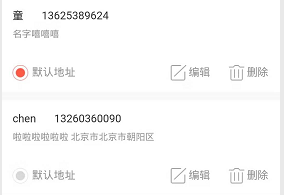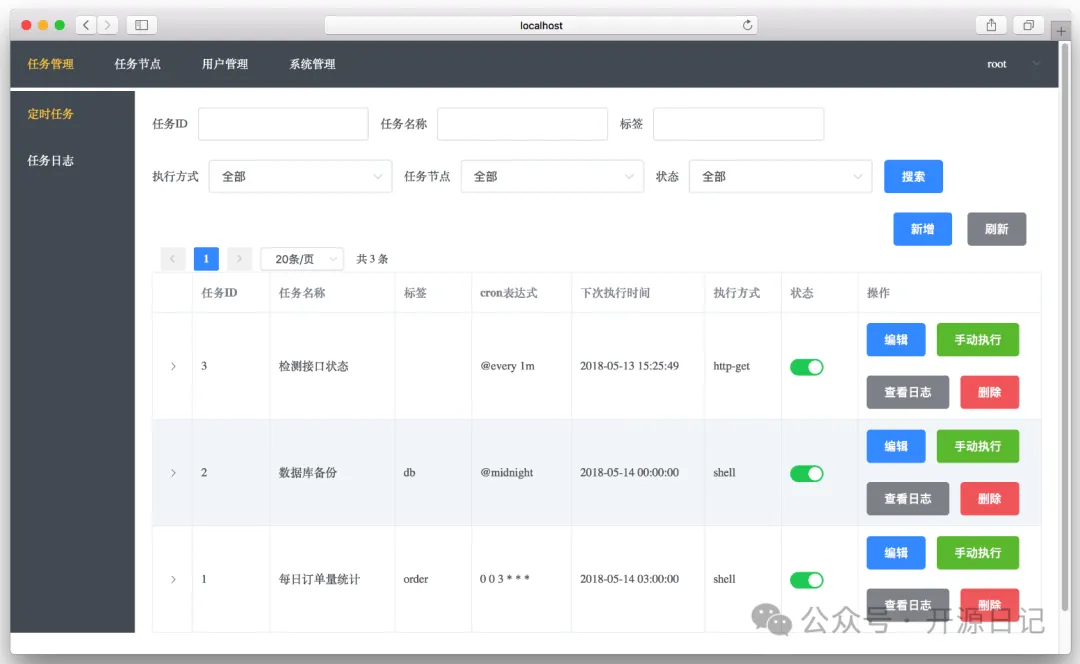本文实例讲述了微信小程序tabBar模板用法。分享给大家供大家参考,具体如下:
众所周知,微信小程序的tabBar都是新开页面的,而微信文档上又表明了最多只能打开5层页面。这样就很容易导致出问题啦,假如我的tabBar有5个呢?下面是微信原话:
一个应用同时只能打开5个页面,当已经打开了5个页面之后,wx.navigateTo不能正常打开新页面。请避免多层级的交互方式,或者使用wx.redirectTo
因此这几天想着根据微信tabBar数组来自定义模板供页面调用。不过我在list里面每个对象都增加了一个selectedColor和active属性,方便对每个tabBar当前页做样式,如果不传直接使用设置的selectedColor。因此这串数据只能设定在各个页面下,不能设定在公用的app.js配置文件下,稍微有点代码冗余,下次研究下怎么直接配置到app.js完善下。
只要新建一个tarBar.wxml模板页,然后引用模板的页面传入数据即可,代码如下:
<template name=\"tabBar\">
<view class=\"flex-h flex-hsb tab-bar\" style=\"color: {{tabBar.color}}; background: {{tarBar.backgroundColor}}; {{tabBar.position==\'top\'? \'top: 0\' : \'bottom: 0\'}}; {{tabBar.borderStyle? (tabBar.position==\'top\'? \'border-bottom: solid 1px \'+tabBar.borderStyle + \';\' : \'border-top: solid 1px \'+tabBar.borderStyle + \';\') : \'\'}}\">
<block wx:for=\"{{tabBar.list}}\" wx:key=\"pagePath\">
<navigator url=\"{{item.pagePath}}\" open-type=\"redirect\" class=\"menu-item\" style=\"{{item.active? \'color: \'+(item.selectedColor? item.selectedColor : tabBar.selectedColor) : \'\'}}\">
<image src=\"{{item.selectedIconPath}}\" wx:if=\"{{item.active}}\"></image>
<image src=\"{{item.iconPath}}\" wx:if=\"{{!item.active}}\"></image>
<text>{{item.text}}</text>
</navigator>
</block>
</view>
</template>
接下来进行测试,首先是index.js的配置对象:
//配置tabBar
tabBar: {
\"color\": \"#9E9E9E\",
\"selectedColor\": \"#f00\",
\"backgroundColor\": \"#fff\",
\"borderStyle\": \"#ccc\",
\"list\": [
{
\"pagePath\": \"/pages/index/index\",
\"text\": \"主页\",
\"iconPath\": \"../../img/tabBar_home.png\",
\"selectedIconPath\": \"../../img/tabBar_home_cur.png\",
//\"selectedColor\": \"#4EDF80\",
active: true
},
{
\"pagePath\": \"/pages/village/city/city\",
\"text\": \"目的地\",
\"iconPath\": \"../../img/tabBar_village.png\",
\"selectedIconPath\": \"../../img/tabBar_village_cur.png\",
\"selectedColor\": \"#4EDF80\",
active: false
},
{
\"pagePath\": \"/pages/mine/mine\",
\"text\": \"我的\",
\"iconPath\": \"../../img/tabBar_mine.png\",
\"selectedIconPath\": \"../../img/tabBar_mine_cur.png\",
\"selectedColor\": \"#4EDF80\",
active: false
}
],
\"position\": \"bottom\"
}
index.wxml引入模板:
<import src=\"../../template/tabBar.wxml\" />
<template is=\"tabBar\" data=\"{{tabBar: tabBar}}\" />
接下来是mine.js文件引入配置对象:
//配置tabBar
tabBar: {
\"color\": \"#9E9E9E\",
\"selectedColor\": \"#f00\",
\"backgroundColor\": \"#fff\",
\"borderStyle\": \"#ccc\",
\"list\": [
{
\"pagePath\": \"/pages/index/index\",
\"text\": \"主页\",
\"iconPath\": \"../../img/tabBar_home.png\",
\"selectedIconPath\": \"../../img/tabBar_home_cur.png\",
//\"selectedColor\": \"#4EDF80\",
active: false
},
{
\"pagePath\": \"/pages/village/city/city\",
\"text\": \"目的地\",
\"iconPath\": \"../../../img/tabBar_village.png\",
\"selectedIconPath\": \"../../../img/tabBar_village_cur.png\",
\"selectedColor\": \"#4EDF80\",
active: false
},
{
\"pagePath\": \"/pages/mine/mine\",
\"text\": \"我的\",
\"iconPath\": \"../../img/tabBar_mine.png\",
\"selectedIconPath\": \"../../img/tabBar_mine_cur.png\",
\"selectedColor\": \"#4EDF80\",
active: true
}
],
\"position\": \"bottom\"
}
mine.wxml引入模板:
<import src=\"../../template/tabBar.wxml\" />
<template is=\"tabBar\" data=\"{{tabBar: tabBar}}\" />
最后演示如下:

方案二,我把配置数据统一放在app.js文件,通过点击跳转页面后在把数据添加到当前页面实例上,具体做法如下:
1、app.js文件配置:
//app.js
var net = require(\'common/net\');
var a_l, a_d = {}, a_cbSucc, a_cbSuccFail, a_cbFail, a_cbCom, a_h, a_m;
App({
onLaunch: function () {
var that = this;
},
//修改tabBar的active值
editTabBar: function () {
var _curPageArr = getCurrentPages();
var _curPage = _curPageArr[_curPageArr.length - 1];<span style=\"font-family: Arial, Helvetica, sans-serif;\">//相当于Page({})里面的this对象</span>
var _pagePath=_curPage.__route__;
if(_pagePath.indexOf(\'/\') != 0){
_pagePath=\'/\'+_pagePath;
}
var tabBar=this.globalData.tabBar;
for(var i=0; i<tabBar.list.length; i++){
tabBar.list[i].active=false;
if(tabBar.list[i].pagePath==_pagePath){
tabBar.list[i].active=true;//根据页面地址设置当前页面状态
}
}
_curPage.setData({
tabBar: tabBar
});
},
globalData: {
userInfo: null,
//配置tabBar
tabBar: {
\"color\": \"#9E9E9E\",
\"selectedColor\": \"#f00\",
\"backgroundColor\": \"#fff\",
\"borderStyle\": \"#ccc\",
\"list\": [
{
\"pagePath\": \"/pages/index/index\",
\"text\": \"主页\",
\"iconPath\": \"/pages/templateImg/tabBar_home.png\",
\"selectedIconPath\": \"/pages/templateImg/tabBar_home_cur.png\",
\"selectedColor\": \"#4EDF80\",
active: false
},
{
\"pagePath\": \"/pages/village/city/city\",
\"text\": \"目的地\",
\"iconPath\": \"/pages/templateImg/tabBar_village.png\",
\"selectedIconPath\": \"/pages/templateImg/tabBar_village_cur.png\",
\"selectedColor\": \"#4EDF80\",
active: false
},
{
\"pagePath\": \"/pages/mine/mine\",
\"text\": \"我的\",
\"iconPath\": \"/pages/templateImg/tabBar_mine.png\",
\"selectedIconPath\": \"/pages/templateImg/tabBar_mine_cur.png\",
\"selectedColor\": \"#4EDF80\",
active: false
}
],
\"position\": \"bottom\"
}
}
})
2、index.js+mine.js+city.js页面使用:
var App=getApp();
Page({
data:{
detail: {},
},
onLoad:function(options){
App.editTabBar();//添加tabBar数据
var that=this;
}
})
最终演示和上图一致!
附:完整demo代码点击此处本站下载。
希望本文所述对大家微信小程序开发有所帮助。
© 版权声明
THE END











暂无评论内容